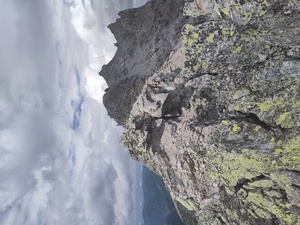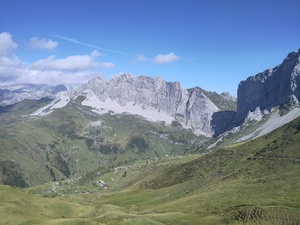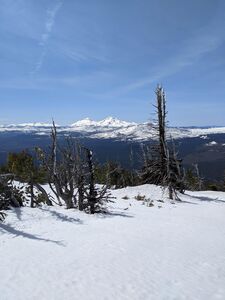2023-09-07
I signed up for the 170k UTMR race as an exciting next challenge after the 2022 UTMB. I'd only heard great things about the course, the atmosphere, and the community, as was looking forward to something a little more grassroots. I had a nice set of races planned, leading up to it, but injury, work stress, and illness meant that I completed none of my planned training races and got very little running volume.
I did get in a couple of 30+km, very steep days in the Alps, though, before the race. First an extended version of the super-popular Pizol 5 lakes loop, starting from the valley floor and tagging the summit of Pizol. Second, a gorgeous loop through the Schweizertor into Austria and back with Tim and Bojan.


However, I felt very tired at the end of those, which wasn't too encouraging, as they were obviously each only about 20-25% of the length of the real race. I have finished races against my doubts before, though, and was too late to change to a different distance, so figured I'd give it a shot.
I headed up to Grächen on the day before the race, arriving with plenty of time to find the campsite, get set up, and wander around before eating a pizza at a restaurant in town. The campsite was a bit further from the start than I had thought - it would involve hiking 1-2 km including some very steep uphill to get to the start line.
The night wasn't so restful, as there was some sort of clanking flagpole, and of course I never sleep well waiting for a 02:45 alarm, as I'm afraid I'll miss it. I hiked up the hill with my enormous backpack (tent, sleeping bag, 3 drop bags, and race gear). I was a bit slow getting to the bathroom and back, so was right at the back of the pack for the start.
Conventional wisdom is that it's a bit silly that some people start so fast in ultras - you're going to be out there for hours or days, and you're racing right of the line?! I've never gone crazily fast, but I have always gone faster than intended. This time I really did go out slow, near the back of the pack, and it didn't have the desired effect. The course starts with a lot of steep, narrow trails where passing requires quite a burst of energy. It wasn't any less tiring or more enjoyable, just slower and more crowded. I think going out at a good pace and then settling into something reasonable, once it thins out a little, is a fine strategy (if well trained).
After three long hours before sunrise, things opened up a bit. There were a couple of aid stations with Coke but little food that interested me.
I made it to Zermatt, including going through people actively repaving one of the pathways. I got some soup and used the bathroom, and started on the monster climb. It was very, very bright and I got very hot. Soaking my hat in fountains was very effective, though of course there were only a couple of these, lower down. At a certain point I had to top in the shade of a cable car pole, which was the beginning of the real thoughts to quit.
By the time I made it to Trockener Steg at about 50k, after most of the monster climb except the glacier crossing, I was feeling sick and even though I unexpectedly met Max there, I still bailed. This was the last easy bail point in Switzerland and I had so little hope of finishing that I didn't want to spend hours and hours getting back from Italy. I didn't really want to continue, in a deeper way than I've experienced before. I certainly could have suffered on for a long time, but I wasn't get anything out of it - even now, weeks later, though I regret not finishing, it doesn't sting the way I think it would if I'd bailed on earlier races.
Failure can be a better teacher than success, or perhaps put another way, the best way to learn is to suffer. So, here is an extended set of notes to do better next time.
You have to run a lot. Even in years where I thought I wasn't running enough, I was running more than this year. Intermediate races and big mountain routes are good training themselves, but just as valuable to confirm that you really have been training enough, as it's hard to know exactly how many kilometers, hours, or elevation meters are really required.

My list of training priorities has been something like this:
My biggest actual mistake was not changing objectives earlier. I kept an irrational hope - a certain amount of this has served me well in the past. Good objectives are those you're not quite sure you can do. But as I get older, as in other areas of life, an ability to push myself becomes less of a limiting factor.
This is an important intersection of the "reset" and "efficiency" mantras, I guess. It's not just about forgetting the pain before and pushing more, it's about acting optimally in the current situation, not some imaginary one. Also to think about more is how the tradeoff between listening to yourself and ignoring yourself is different during a race, and in training for it - in training you have much more time and data.
"Just enjoying it" or "seeing what happens" didn't cut it, this time. Because, I wasn't enjoying it. Note just in a "type II fun" way, but in a deeper way that I felt I wasn't getting much out of the experience. I am lucky enough that I have seen the landscape before, and I didn't have to prove to myself I could cover the distance or elevation. I'd already made quite a lot of peace with not finishing, which in a sense is good because I didn't finish and I was okay with it. On the other hand, being too comfortable with quitting makes you more likely to quit, and not quitting is a big part of ultrarunning.
I should have spent the money to get a proper hotel room, instead of camping and hiking the morning of.
This race was at high enough elevation that, iff trying this race again, it'd be helpful to reach high elevations during training and/or spend a few days at elevation before the start.
I cut some corners on the planning and analysis. I usually make a spreadsheet with target splits, notes on available food and water, etc.. I didn't this time, but which I had. The biggest climb was where I quit, and though I was crawling, to be honest I probably wasn't going that much slower than my split would have been. This can put those slow parts in perspective and keep psych up. It might also help visualize beforehand.
I tend to think I've got gear under control, but I also tend to be slow to upgrade, as don't enjoy thinking about or buying gear, once it no longer seems to be a limiting factor. This race exposes a few todos for next time.
I should have spent longer shaving off grams with gear, and planning my drop bags. I didn't devote much energy to picking the lightest version of everything (especially given the amazing forecast) and this race featured a lot of "extra" junk beyond what would be on my personal packing list for safety.
A big mistake was not keeping my electrolyte/caffeine pills on me. I put these in the first drop bag, to save some weight on the first leg, but then didn't see them, as they were hidden amongst some extra gels! These should be considered emergency gear, always on you. It was a psychological blow when I realized I'd forgotten these.
I should shell out for a lighter headlamp, even if it means buying a proprietary battery pack or two.
I should actually find a good way to deal with my glasses. I often end up running with them in my hand or put them loose into a pocket, because they fog up.